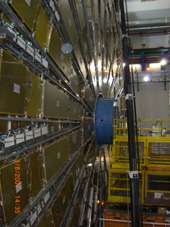Protons - Everything Revolves Around Spin

Current understanding of the spin structure of protons has been summarised in a single book for the first time. The book examines attempts to solve one of the greatest puzzles of physics. Models and experiments to date have been unable to properly explain a fundamental property of protons spin.
Published by Dr. Steven Bass as part of an Austrian Science Fund FWF project, the book summarises over 1,000 publications and the results of a global research programme on this phenomenon.
Many particles rotate around their own axis like spinning tops. However, unlike spinning tops, this spin has a fundamental influence on the properties of the particle - and therefore on our world. Quantum physical interactions mean that spin is responsible for the magnetic moment of protons, and therefore also the stability of the universe. It is a truly fundamental force. This makes it all the more surprising that experiments have so far failed to identify the origin of 30 percent of proton spin.
Dr. Steven Bass, from the Institute of Theoretical Physics at the University of Innsbruck and a researcher at CERN (European Organisation of Nuclear Research), has summarised the current understanding of this discrepancy in a new book. Besides referring to 1,000 publications on the theory of spin, he also presents the results of a worldwide research programme that was carried out in the particle accelerators of CERN, DESY (German Electron Synchrotron), BNL (Brookhaven National Laboratory), JLab (Jefferson Laboratory) and SLAC (Stanford Linear Accelerator Centre).
Dr. Bass on the missing spin of protons: "Protons are combinations of more basic entities called quarks and gluons. Each proton is made up of three quarks that are bound together by the gluons. Just like the protons, the quarks and gluons themselves also spin. The spin of the proton is therefore generated by the spin of its constituent parts. For example, current models state that 60 percent of the spin of a proton must originate from the spin of the quarks. The remaining 40 percent would therefore come from other types of movement produced by the quarks within the proton. However, experiments involving some of the most advanced particle accelerators in the world indicate that a maximum of 30 percent of proton spin originates from quark spin. So where does the rest come from?"
The aforementioned global research programme was initiated and a whole range of calculations were published in an attempt to find an answer to this question. These efforts are now beginning to bear fruit and it is these results that Dr. Bass has compiled in his book.
The results initially seemed to indicate that the apparent discrepancy was the result of inaccurate interpretation, in other words, that in reality there is no discrepancy. The theory behind this hypothesis is that the spin of the gluons - the particles responsible for binding together quarks - screens quark spin in proportion to the gluon polarisation. This would influence any attempts to measure quark spin and distort calculations. But it was not long before other experiments produced data that contradicted this theory. This data shows that gluon polarisation is not strong enough to account for the "missing" 30 percent of quark spin. However, calculations from even more accurate measurements are expected soon and will deliver new findings - or disprove existing ones.
As a result, we need to constantly re-examine our current understanding of what holds together protons - and for that matter the universe. Dr. Bass, who also heads up an FWF project on this subject, therefore believes that his book has been published at precisely the right time: "The results of new and ever more accurate measurements need to be analysed in the light of the latest understanding. I hope that this book goes some way towards helping achieve this."
Reference: The Spin Structure of the Proton. By Steven D Bass, Publisher World Scientific, ISBN 978-981-270-9479.
Source: Austrian Science Fund (FWF)





















